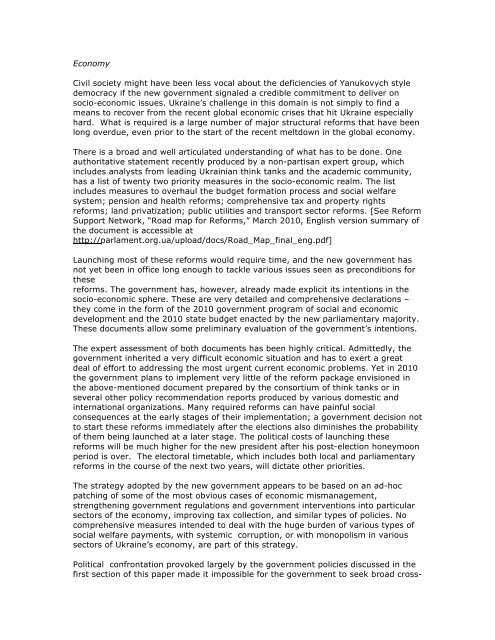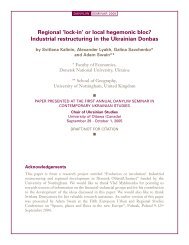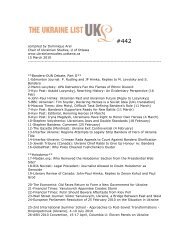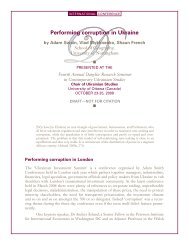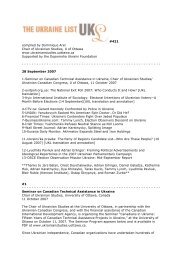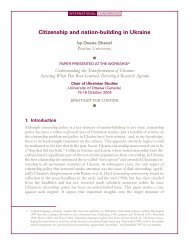UKL444 - Chair of Ukrainian Studies
UKL444 - Chair of Ukrainian Studies
UKL444 - Chair of Ukrainian Studies
Create successful ePaper yourself
Turn your PDF publications into a flip-book with our unique Google optimized e-Paper software.
Economy<br />
Civil society might have been less vocal about the deficiencies <strong>of</strong> Yanukovych style<br />
democracy if the new government signaled a credible commitment to deliver on<br />
socio-economic issues. Ukraine’s challenge in this domain is not simply to find a<br />
means to recover from the recent global economic crises that hit Ukraine especially<br />
hard. What is required is a large number <strong>of</strong> major structural reforms that have been<br />
long overdue, even prior to the start <strong>of</strong> the recent meltdown in the global economy.<br />
There is a broad and well articulated understanding <strong>of</strong> what has to be done. One<br />
authoritative statement recently produced by a non-partisan expert group, which<br />
includes analysts from leading <strong>Ukrainian</strong> think tanks and the academic community,<br />
has a list <strong>of</strong> twenty two priority measures in the socio-economic realm. The list<br />
includes measures to overhaul the budget formation process and social welfare<br />
system; pension and health reforms; comprehensive tax and property rights<br />
reforms; land privatization; public utilities and transport sector reforms. [See Reform<br />
Support Network, “Road map for Reforms,” March 2010, English version summary <strong>of</strong><br />
the document is accessible at<br />
http://parlament.org.ua/upload/docs/Road_Map_final_eng.pdf]<br />
Launching most <strong>of</strong> these reforms would require time, and the new government has<br />
not yet been in <strong>of</strong>fice long enough to tackle various issues seen as preconditions for<br />
these<br />
reforms. The government has, however, already made explicit its intentions in the<br />
socio-economic sphere. These are very detailed and comprehensive declarations –<br />
they come in the form <strong>of</strong> the 2010 government program <strong>of</strong> social and economic<br />
development and the 2010 state budget enacted by the new parliamentary majority.<br />
These documents allow some preliminary evaluation <strong>of</strong> the government’s intentions.<br />
The expert assessment <strong>of</strong> both documents has been highly critical. Admittedly, the<br />
government inherited a very difficult economic situation and has to exert a great<br />
deal <strong>of</strong> effort to addressing the most urgent current economic problems. Yet in 2010<br />
the government plans to implement very little <strong>of</strong> the reform package envisioned in<br />
the above-mentioned document prepared by the consortium <strong>of</strong> think tanks or in<br />
several other policy recommendation reports produced by various domestic and<br />
international organizations. Many required reforms can have painful social<br />
consequences at the early stages <strong>of</strong> their implementation; a government decision not<br />
to start these reforms immediately after the elections also diminishes the probability<br />
<strong>of</strong> them being launched at a later stage. The political costs <strong>of</strong> launching these<br />
reforms will be much higher for the new president after his post-election honeymoon<br />
period is over. The electoral timetable, which includes both local and parliamentary<br />
reforms in the course <strong>of</strong> the next two years, will dictate other priorities.<br />
The strategy adopted by the new government appears to be based on an ad-hoc<br />
patching <strong>of</strong> some <strong>of</strong> the most obvious cases <strong>of</strong> economic mismanagement,<br />
strengthening government regulations and government interventions into particular<br />
sectors <strong>of</strong> the economy, improving tax collection, and similar types <strong>of</strong> policies. No<br />
comprehensive measures intended to deal with the huge burden <strong>of</strong> various types <strong>of</strong><br />
social welfare payments, with systemic corruption, or with monopolism in various<br />
sectors <strong>of</strong> Ukraine’s economy, are part <strong>of</strong> this strategy.<br />
Political confrontation provoked largely by the government policies discussed in the<br />
first section <strong>of</strong> this paper made it impossible for the government to seek broad cross-


